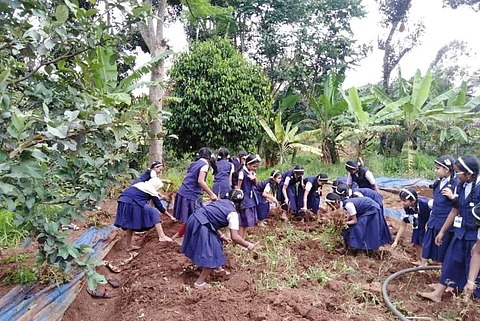

Students of the Holy Queens Upper Primary School in Rajakumari in Kerala’s Idukki district reach their school at 8 am, 1.5 hours before their classes start. Their day at the school begins by watering their farm, plucking weeds and feeding the pet birds. By 9.15 am, they assemble under an awning formed by passion fruit creepers. Following the assembly, class begins. After classes get over at 3 pm, the children are once again back at farming activities, till 4.30 pm or even 5.30 pm as per their wish.
The school recently bagged the Kerala government’s ‘Best educational institution that cultivates vegetables’ award for the fourth time. The institution also won the award in 2015, 2016 and 2017. Apart from this, the upper primary school has received numerous awards and recognition from the government, district administration, other organisations, and the agriculture department for maintaining a green campus.
Almost all the students in the school are from agricultural families. They are the ones who maintain the school farm actively.
“Every year we cultivate paddy in 8 cents of land (around 3,500 sq ft). With the harvested rice we cook payasam (kheer) twice a year and celebrate with the children,” Sr Jessy Joseph, the school’s headmistress, tells TNM.
She says that with farming the school ensures that its students consume pesticide-free vegetables.
The school’s midday meal is rich with dishes prepared with the organic vegetables cultivated in the campus. Fish farming also enables the school to provide fish dishes in its meals for students. The school uses the aquaponics technique for fish farming.
“Some vegetables, such as long beans, grow in plenty, so the kids get tired of eating them. Those vegetables we sell outside, otherwise we consume all our products,” Sr Jessy adds.
With a lot of pride and satisfaction, the 540 students, aged between 6 and 12, and 23 teachers cultivate around 78 varieties of crops, including grains, pulses, tubers and vegetables, around the school in about 0.8 hectares of land. That is the celebration of their success in farming.
“We plant using all possible methods due to space constraints. Radish were planted in used plastic bottles collected from nearby places. PVC pipes, plantain stems, bottles, etc. were used to plant crops,” Sr Jessy says.
Oats, wheat, corn, maize, gingelly, paddy, varieties of cabbage including kale, broccoli, radish, carrot and many other vegetable varieties are being cultivated in the school.
“The cultivation was extended in 2012. Cooperation from the Parent Teacher Association and the children’s hard work and enthusiasm has helped us achieve all this,” the headmistress says.
“Above everything, the children love farming. Their interest increases on seeing the success in the harvest,” she adds.
Sr Jessy emphasises that life skills and extracurricular activities are relevant along with academics.
“It’s not just academics, we should build a generation that can live successfully under any adverse situation,” she says.